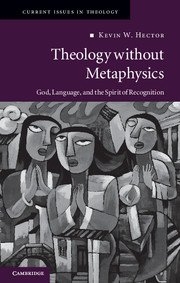2 - Concepts, rules, and the Spirit of recognition
Published online by Cambridge University Press: 05 June 2012
Summary
The present project aims to render optional a particular picture of God and language – namely, one framed by essentialist-correspondentist metaphysics – by setting alongside it a picture which takes ordinary practices and experience as its explanatory basis, and which thus frees one from the nostalgia one might otherwise feel for such metaphysics. As noted in the first chapter, metaphysics encourages one to hold inflationary notions of fundamental reality and of what it means to be in touch with reality, such that to be freed from its grip, one must be freed from the continuing influence of these notions; otherwise, the rejection of metaphysics will feel like a limitation, as if one were alienated from reality. The previous chapter already discussed an account according to which there need be no distance between God and God-with-us, but this claim faces an obvious problem: even if that account were wholly persuasive, it would not follow that metaphysics had been rendered optional, for the simple reason that the very use of language may betray even the best of anti-metaphysical intentions. According to one highly influential view, at least, metaphysics is written into language itself, from which it would follow that an anti-metaphysical discourse about God is necessarily self-defeating. On this view, language, particularly in its predicative varieties, is thought to be inescapably violent, since it forces objects to fit into predetermined categories.
I agree that such violence must be avoided, but, from a therapeutic point of view, it would appear that the problem is overstated, and that this overstatement seems plausible only on the assumption of a residually metaphysical picture of language. This and the following three chapters aim to free us from this assumption by elaborating an alternative account of language and its relationship to God. The overall strategy is (a) to explain semantical notions such as meaning, truth, and so forth in terms of the norms implicit in recognitive practices, in order to construct a non-metaphysical account according to which language is fit for God’s use of it, and then (b) to argue that the normative Spirit of Christ enables language to be meaningful and true of God by entering into, and so circulating through, these same practices. The present chapter begins, therefore, by explaining the norms implicit in ordinary concept use by appeal to social practices in which performers and performances are recognized as “going on in the same way” as certain precedents. On the strength of this explanation, it will become clear that concepts need not be thought of as “containers,” nor as necessarily violent. I then argue that the normative Spirit of Christ is mediated through these same recognitive practices, and use this account to explain theological concept use: one’s use of a concept counts as following Christ, on this view, only if it goes on in the same way as precedent uses which have been recognized as doing so, in a chain of mutual recognition that stretches back to those recognized by Christ himself. This account thus provides some crucial resources with which to free us from the metaphysical picture of concepts, according to which one’s use of a concept corresponds to an essence-like idea or “meaning,” and so free us from the sense that concept use fits objects into predetermined categories.
- Type
- Chapter
- Information
- Theology without MetaphysicsGod, Language, and the Spirit of Recognition, pp. 47 - 102Publisher: Cambridge University PressPrint publication year: 2011

